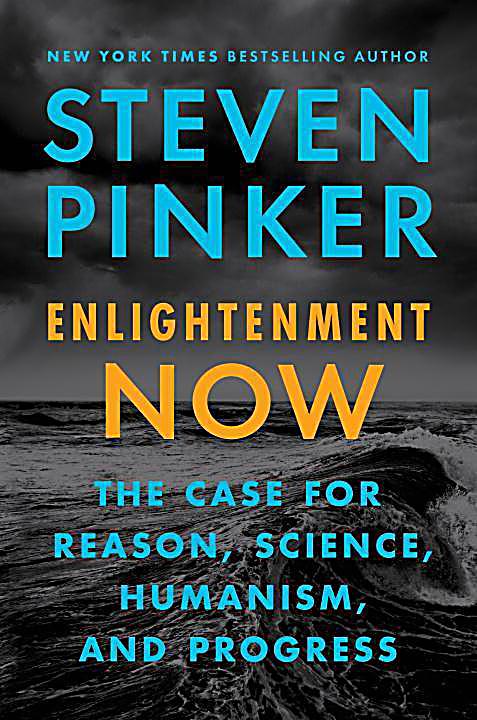
Think of Aristotle's "flourishing" as our human fulfillment. That aligns well with Steven Pinker's argument addressing "people who care about arguments." Impatient with both the claims of traditional religious systems and of New Age "magical thinking," he elaborates on the critique made last year by Kurt Anderson in "Fantasyland" about the decline in rational thinking across the political spectrum in America. Defending "mainstream intellectual culture," this Harvard professor of psychology expands on his "The Better Angels of Our Nature" to prove--by about 85 charts over hundreds of pages--that progress and the goals of the Enlightenment matter most for our recognition of human progress and critical thinking.
He begins by noting the Axial Age as spun into motion by the "energy capture" of more calories from agriculture to 20,000 a day in various forms. This growth in sophisticated thinking and social organization was enhanced by language, "the original memory app." Countering entropy, information and evolution allow people to overcome a naturally "illiterate and innumerate" existence, while battling the specters of "blind justice" and sky-gods.
Part 2 looks at progress. He translates data into drama, as when after a chart of declining infant mortality 1751-2013 he eloquently reminds us of the tragedy and hope behind such dry measurements, within so many families past and present. He turns to the nuclear threat and finds it exaggerated; the Doomsday Clock's a "propaganda stunt." Pinker assures us that most terrorists are "bumbling schlemieles." and that "nuclear scare tactics" blind us to the success post-1945 of treaties and commonsense. As for the 45th President, Pinker eschews over-estimating any apocalyptic outbreak and he puts such a leader in place as spawned by a current blip in "authoritarian populism." He emphasizes the advances overall in our stability and success due to "systematic forces" over centuries, and cautions us against "dystopian rhetoric" about passing politicians amidst media hype. He notes that the "alt-right" comprises 50,000 in the U.S., 0.02 of the population.
The warning about media frenzy continues through the lengthy part 3, where reason, science, and humanism through a variety of fields and short chapters scan considerable ground across not only the sciences but some of the humanities. Pinker may have, for all his erudition, stretched himself here beyond his expertise but this is a popular book, meant to "defy any simple narrative" and to encourage reflective analyses. He's encouraged by curricula promoting critical skills to thwart an endemic polarization in beliefs expressing "identity-protective cognition." That is, when humans can't let go of opinions long held for the outmoded likes of tribal glory and one's personally elevated status within the in-crowd. This leftover default reaction we all inherit has weakened our ability to engage in rational public discourse. He suggests that the media depoliticize issues, distinguish facts from claims, and detach news coverage from an imitation of extreme sports coverage by pundits when it comes to observing and promoting the political scene through journalism. Quixotic as this may be, it's encouraging to hear this sensible proposal.
He draws on work by his partner, Rebecca Newberger Goldstein, to bolster his refutation of theist proofs. He avers our ancestors were not always trustworthy, and that "dunce-cap history" dumbs down the plain fact that religion is not a source of morality, and that scientists and philosophers might be, after all the myth and the mystical, right about the fundamental questions of existence. He shrugs away any notion that this universe is fine-tuned by a Creator, and reckons we're lucky to have won the equivalent of the cosmic jackpot, in our good fortune to live as and where we do.
I did find, for all my amateur status as a lay reader, some places where the assertions flew by without necessary verification. For instance, early on Pinker asserts that IQ scores prove that we're smarter than our ancestors by "two standard deviation points." But in a paragraph where other information has documentation in end-notes, this particular point does not. I wanted to know who determined this finding, and over how long had it been determined. If we're "smarter by 30 points than our ancestors," has this been due to schooling and literacy, or to other factors? This kind of reasoning exhibits the foundations upon which Pinker's broad thesis rests, so one expects that each iota of detail supports his general assessment.
"Enlightenment Now" displays a bit of welcome wit and a sharp intellect at work. As Pinker reiterates, romantic reactions and reactionary ideologies will not assist our survival. Our health increases, our longevity lengthens, our liberty broadens, and our happiness rises. Pinker's no Pangloss or Pollyanna, but he hammers home the evidence amassed and displayed that any problems with our predicament remain inevitable on the upward trajectory, if "defying any simple narrative." 450 closely printed pages of text elucidating this and 75 pages of documentation display how no catch phrases or naive platitudes can capture the considerable and ever-increasing complexity of how humans continue to move forward.
(This was distributed to me in an advance reading copy by the publisher, and that does not effect my review in any way. Thanks for reading it.) Posted with slight changes to Amazon US 2/13/18.






















No comments:
Post a Comment